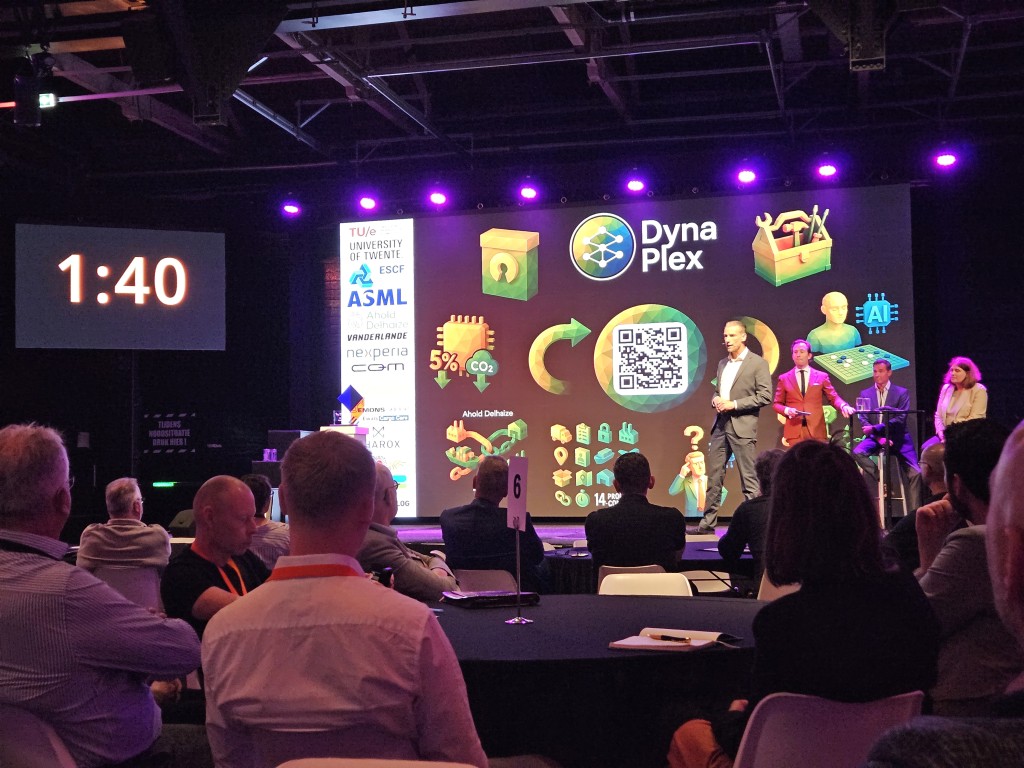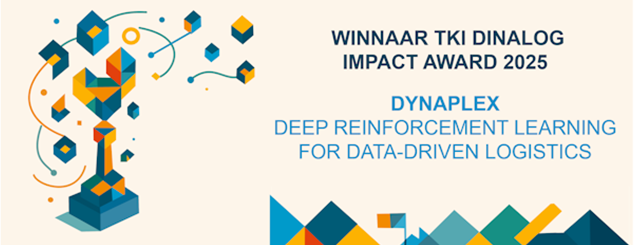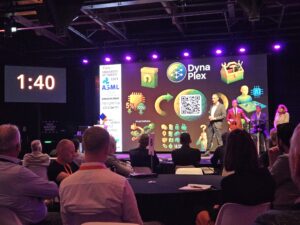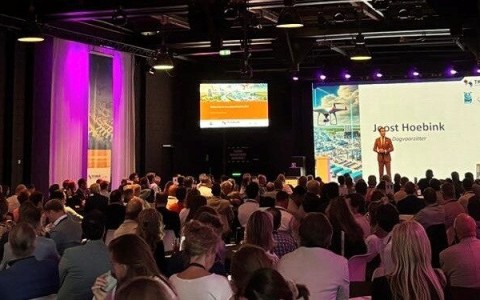From board game to logistics solutions: DynaPlex awarded with Impact Award

 On May 20, DynaPlex won the TKI Dinalog Impact Award during the innovation conference. Within this project, an eponymous open source software was developed that helps companies make better logistics decisions, inspired by the self-learning AlphaGo algorithm. Speaking are the researchers involved Martijn Mes (University of Twente) and Willem van Jaarsveld (Eindhoven University of Technology). “This is a great recognition for the results we have achieved with the entire consortium.”
On May 20, DynaPlex won the TKI Dinalog Impact Award during the innovation conference. Within this project, an eponymous open source software was developed that helps companies make better logistics decisions, inspired by the self-learning AlphaGo algorithm. Speaking are the researchers involved Martijn Mes (University of Twente) and Willem van Jaarsveld (Eindhoven University of Technology). “This is a great recognition for the results we have achieved with the entire consortium.”
 When AlphaGo beat South Korean grandmaster Lee Sedol in the strategic board game Go in 2016, it was revolutionary. Not just because Go is much more complex than chess, but mainly because Google DeepMind's artificial intelligence had not learned from humans. It had figured out on its own how to win. “This was a sensational moment,” says Martijn Mes of the University of Twente. "Willem and I independently felt: we have to do something with this. If this kind of AI can discover such strategies in board games, this could also be a breakthrough in logistical puzzles."
When AlphaGo beat South Korean grandmaster Lee Sedol in the strategic board game Go in 2016, it was revolutionary. Not just because Go is much more complex than chess, but mainly because Google DeepMind's artificial intelligence had not learned from humans. It had figured out on its own how to win. “This was a sensational moment,” says Martijn Mes of the University of Twente. "Willem and I independently felt: we have to do something with this. If this kind of AI can discover such strategies in board games, this could also be a breakthrough in logistical puzzles."
DynaPlex: the AlphaZero of logistics. We followed AlphaGo with AlphaZero, an algorithm that can learn numerous board games and beat humans. This was also the inspiration for DynaPlex: a toolbox based on reinforcement learning that helps companies make better logistics decisions. "We thought: if an AI in Go or chess can learn what a good move is, then it should be able to do the same when planning inventories or transport routes. In logistics, you have to anticipate things you don't know yet, for example what customers order. Just like in a game, because you don't know what the opponent is going to do," says the professor.
Reinforcement learning is about making smart choices, step by step, in situations full of uncertainty. It is not just about predicting, but mainly about deciding. "A good prediction is not yet a good decision," says Martijn Mes. "There is much more to it. You also have to understand the consequences of what you do." Whereas many logistics software works with fixed rules or assumptions, DynaPlex actually learns constantly. It adapts as circumstances change.
Five per cent more efficient inventory management at ASMLThe approach paid off, and there are now 14 successful case studies. One of the project's success stories, he says, is the application at chip machine manufacturer ASML, which master's students Joost ter Haar, Tjum van Dijck, and Marco Ochoa graduated on. "There we could really show that more efficient inventory management led to five per cent cost savings. And we don't just say that," says project leader Willem van Jaarsveld of Eindhoven University of Technology. The toolbox was also tested at NXP, Albert Heijn and Vanderlande, sometimes with simulations, sometimes with real customer data.
Even without fully tracking the software's outcomes, DynaPlex provides valuable insights. Mes: "You can already learn a lot by watching when AI does something different from what you would do yourself. Then you suddenly discover alternatives you would never have thought of yourself." Like AlphaGo, which made a surprising move against the world champion. "The AI not only makes decisions, but also shows patterns and choices that planners can learn from," he explains. Students used heatmap to show which action the AI chooses at which stock levels. Planners can adopt those actions and start experimenting with them.
Open, modular and scalableDynaPlex is open-source and modular. Researchers and companies can add new models or modify existing components themselves. What drives Van Jaarsveld is not only scientific curiosity, but also a practical desire: the technology must be usable by companies. "The best thing is when something is complex on the inside, but feels simple on the outside. Like an iPhone," he says. This is why those involved are now working on a Python functionality to make the software more accessible.
 The researcher is very honored to win the TKI Dinalog Impact Award. “It is a great recognition for the work and results we have achieved with the entire consortium,” he says. Although the project officially ended in May, the toolbox grows stronger with each new practical application.
The researcher is very honored to win the TKI Dinalog Impact Award. “It is a great recognition for the work and results we have achieved with the entire consortium,” he says. Although the project officially ended in May, the toolbox grows stronger with each new practical application.
Van Jaarsveld: "We will continue to further develop the DynaPlex toolbox so that more and more organisations can easily use it and together we will bring the chain management of the future closer."
Wondering what DynaPlex can do for your organisation?
Discover the open-source toolbox that applies AI to logistics puzzles and has already proven impact at companies like ASML and Albert Heijn. Whether you are a researcher, student or working on supply chain optimisation - join the community and help improve tomorrow's logistics.
Check out the software and documentation
Interested in collaboration or testing within your organisation? Get in touch with us!
More news

Battle for TKI Dinalog Impact Award erupts at Innovation Conference 2025

Innovation Conference 2025: "Logistics is an enabler of societal transitions"

